박물관은 한 나라의 역사와 문화가 살아 숨 쉬고 과거와 현재, 미래가 공존하는 공간이다. 또한 그 나라의 문화의 힘을 확인할 수 있는 장소이기도 하다. 코리아넷이 대한민국의 지역별 국립박물관 6곳을 선정, 그곳에서 놓쳐선 안될 대표 소장품을 소개한다. 첫 번째 순서로 대한민국을 대표하는 박물관이자 가장 오래된 역사를 자랑하는 국립중앙박물관으로 가본다.
A museum is where a country's history and culture live and breathe and the past, present, and future coexist, as well as showing the nation's cultural power. Korea.net has selected six national museums by region to introduce leading must-see works displayed at each. The first is the flagship National Museum of Korea, which has the longest history in the country.
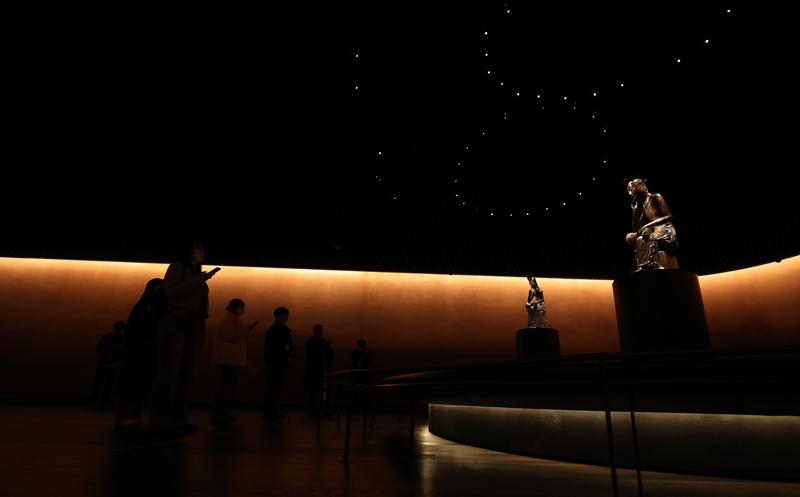
▲ 별과 우주를 의미하는 천장, 계피와 편백의 향을 은은하게 내뿜는 황토벽으로 이루어진 '사유의 방'은 두 점의 반가사유상만을 위한 공간이다. 440m² 규모의 전시장은 안쪽으로 갈수록 바닥이 살짝 높게 설계돼 있고 벽도 기울어져 있다. The Room of Quiet Contemplation is exclusively for the two statues of Pensive Bodhisattva. Its ceiling symbolizes the stars and universe and the red clay wall gently exudes a soft scent of cinnamon and cypress in a room of around 440 square m. The floor gets higher the deeper one goes into the room, and the walls are slanted.
1. '사유의 방'에서 만나는 '반가사유상' - Two statues of Pensive Bodhisattva in Room of Quiet Contemplation
'두루 헤아리며 깊은 생각에 잠기는 시간'이란 글귀를 따라 컴컴한 입구로 들어선다. 곧 묘한 음악과 함께 우주의 확장과 물질의 순환을 그려낸 흑백의 영상을 마주하게 된다. 눈은 금세 어둠에 순응하고 천천히 발걸음을 옮긴다. 어느덧 고요한 통로의 끝에 다다르고, 살짝 발끝을 돌리자 두 점의 반가사유상이 우리를 맞이한다.
The written phrase "Time to ponder extensively and deeply contemplate" precedes going into a dark entrance. A black and white video shows the expansion of the universe and circulation of substances accompanied by peculiar background music. The eyes soon adjust to the dark while slowly walking in. In a flash, the end of the serene passage appears and a slight turn leads to the two statues of Pensive Bodhisattva.
이곳은 박물관 2층에 자리 잡은 '사유의 방'. 국보로 지정된 반가사유상 두 점만이 나란히 전시되어 있다. This second-floor room at the museum is the Room of Quiet Contemplation, which houses both relics designated National Treasures.
오른발을 왼쪽 무릎에 가볍게 얹고 오른손을 살짝 뺨에 댄 채, 눈을 뜬 것도 감은 것도 아닌 상태로 오묘한 미소를 띤다. 그러면서 깊은 생각에 잠겨 있는 듯한 모습이 보는 사람들로 하여금 편안함을 느끼게 해 준다.
The statues lightly perch their right feet on their left knees and gently place their right hands on their cheeks. Their eyes seem neither closed nor opened and have mysterious smiles while looking as if in deep contemplation, providing comfort to viewers.

'사유의 방'에는 다른 전시실과는 달리 두 가지가 없다. 전시품에 대한 해설과 진열장이다. The room lacks two things that other exhibition halls have: written explanations and display cases.
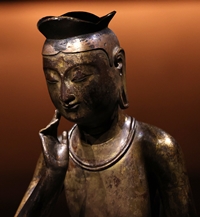
▲ '사유의 방' 오른쪽에 있는 반가사유상의 모습 The pensive Bodhisattva statue on the right side of the Room of Quiet Contemplation
전시실 내부에 안내문이 없어 관람객은 오롯이 작품에 집중하며 자신만의 해석을 해 볼 수 있다. 대신 입구와 출구에 자세한 정보를 알 수 있는 QR코드가 있다.
The hall has no written signs to allow visitors to focus solely on the statues and interpret them in their own ways. A QR code at the entrance and the exit, however, provides detailed explanations.
진열장 역시 설치돼 있지 않기 때문에 아무런 제한 없이 반가사유상의 정면, 측면, 후면까지 360도 볼 수 있어 관람객이 느끼는 경험의 깊이도 다르다.
No display case means a 360-degree view of the statues from the front, side, and rear without restriction for a deeper experience.
양수미 국립중앙박물관 미술부 학예연구사는 "특정 소장품만을 위해 공간까지 설계한 사례는 많지 않다”며 “사유의 방은 시각적, 후각적, 청각적 감각이 총체적으로 집약된 곳”이라고 설명했다.
"We have few cases of creating a separate space just for a certain collection," said Yang Sumi, associate curator of the museum's Fine Arts Division. "The Room of Quiet Contemplation is where visual, olfactory, and auditory senses are integrated."
그러면서 "초현실적인 이곳에서 반가사유상을 보며 스스로에게 집중하며 생각하는 시간을 가지셨으면 좋겠다"고 전했다.
"We hope that you have time to focus and think for yourself while looking at the Pensive Bodhisattva statues at this surreal place."
2. 우뚝 솟은 '경천사 십층석탑' - Towering Ten-story Stone Pagoda from Gyeongcheonsa Temple Site
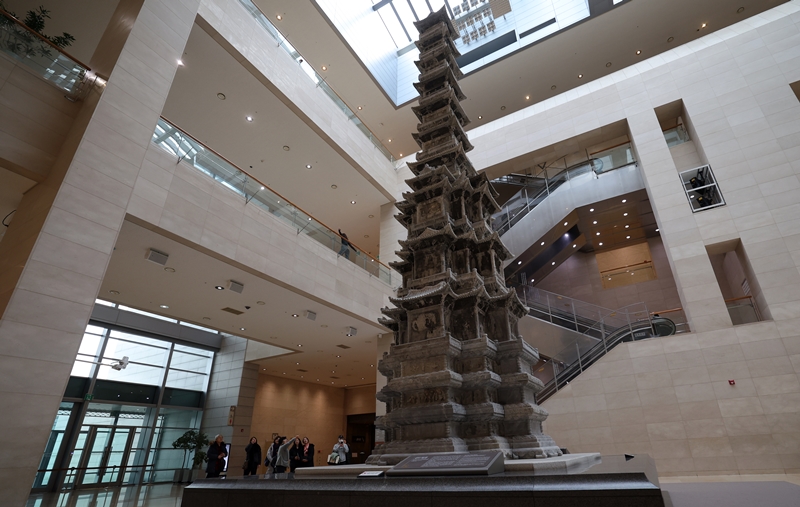
▲ 아파트 5층 높이에 가까운 13.5m의 웅장한 규모를 자랑하는 경천사탑은 1962년에 국보로 지정됐다. 기단부와 1층에서 3층까지는 몽골, 티베트계 불교에서 영향 받은 형태, 이후 4층에서 10층까지는 전통적 형태를 보여준다 - The Ten-story Stone Pagoda from Gyeongcheonsa Temple Site is 13.5 m tall, or the height of a five-story apartment building. Designated a National Treasure in 1962, the relic has a foundation layer, and its first to third layers show influences from Mongolian and Tibetan Buddhism, while the fourth to 10th layers show traditional Korean styles.
상설전시실 1층 가장 안쪽에는 박물관을 관통하며 우뚝 솟아있는 탑이 하나 있다. 가까이 다가가보면 화려한 모습에 한 번 감탄하고, 한참을 올려다봐야 끝이 보이는 쭉 뻗은 모습에 두 번 감탄하게 된다. 고려 말에 만들어진 '경천사 십층석탑(경천사탑)'이다.
The innermost side of the museum's permanent exhibition hall on the first floor sits a towering pagoda. Looking at it from close distances provokes awe and looking up above at its stretched-out appearance does the same. The Ten-story Stone Pagoda from Gyeongcheonsa Temple Site was made during the late Goryeo Dynasty (918-1392).
한국은 화강암이 주 암석이라 현존하는 대다수의 석조물은 화강암으로 만들어졌다. 하지만 경천사탑은 대리석으로 만들어져 그 가치가 높다. 거기다 간결한 외형의 전통적 석탑과는 달리 탑을 둘러싼 면마다 불교와 관련된 이야기와 부처가 조각돼 있어 재질도, 양식도 모두 특별한 의미를 갖는다.
Most stone structures in the country are made of granite, which is the main rock type in the country, but this pagoda is made of marble and thus has high value. Unlike a traditional pagoda with a simple facade, this model depicts on each side anecdotes related to Buddhism and carved images of Buddha, so both the pagoda's material and style bear special meaning.
탑을 자세히 들여다보면 가장 아래쪽 기단부에는 사자, 용, 연꽃 등을 비롯해 소설 '서유기'의 장면, 그리고 나한(불교에서 가장 높은 경지에 오른 이)들이 조각돼 있다.
A closer look at the pagoda shows at the lowest stylobate (foundation) images of lions, dragons, lotus flowers, and nahan (arhats), referring to Buddhist disciples who have reached nirvana, as well as scenes from the 16th-century Buddhist novel "Journey to the West."
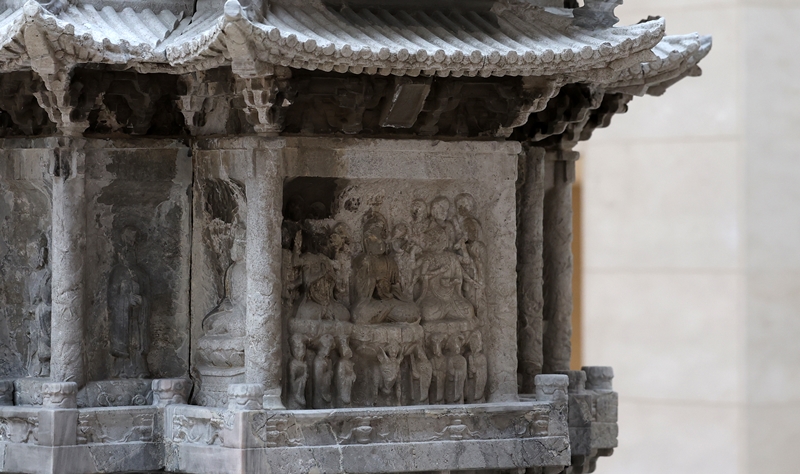
▲ '경천사 십층석탑'은 1348년 고려 충목왕 4년 경기도 개풍군 광덕면 부소산 자락의 경천사에 처음 세워졌다. 사진은 탑의 3층에 새겨져 있는 불회 장면. The Ten-story Stone Pagoda from Gyeongcheonsa Temple Site was built in 1348, the fourth year of Goryeo Dynasty King Chungmok's reign, at the temple on the edge of Busosan Mountain in Gwangdeok-myeon Township of Gaepung-gun County, Gyeonggi-do Province. The third floor shows an image of Buddha giving a dharma talk.
탑신부 1~4층에는 부처가 설법하는 장면과 불보살(부처와 보살), 호법신(불교를 수호하는 신을 총칭하는 말), 탑의 건립 배경을 알려주는 글이 새겨져 있다. 이어 5~10층에는 선정인(부처가 수행할 때 어떤 경지에 올라 흐트러짐 없는 상태에 들었음을 상징하는 손 모양) 또는 합장을 한 불좌상이 새겨져 있다. 상단부로 올라갈수록 불교의 위계에 따라 높은 위치의 존상이 표현돼 있다.
The first to fourth layers above the foundation depict scenes of Buddha giving a dharma talk, an image of Buddha and bodhisattvas, guardians of Buddhist teachings, and texts on the background behind the pagoda's establishment. From the fifth to 10th floors are engravings showing Buddha making seonjeongin, a hand gesture that signifies his attainment of a certain state and meditating undisturbed, as well as images of him seated with his hands together. The higher the layer, the higher the status of the figures depicted under the Buddhist hierarchy.
경천사탑은 겉으로 보기에는 화려하고 당당한 위용을 자랑하지만 그 이면에는 문화재 수탈이라는 아픔도 갖고 있다. 1907년 일본으로 불법 반출됐다가 여러 사람의 노력을 통해 1918년 한국으로 되돌아왔고, 복원된 석탑은 1960년 경복궁 앞마당에 다시 세워졌다. 하지만 대리석으로 된 경천사탑은 산성비 등 환경오염에 취약해 정밀 보존처리를 거쳐 2005년 지금의 박물관 내부에 서게 됐다.
The pagoda might look fancy on the outside with an imposing majesty, but it has a painful history of being looted. It was smuggled into Japan in 1907 but returned in 1918 through the efforts of many people and was erected in front of Gyeongbokgung Palace in 1960. Because this marble relic is vulnerable to environmental pollution like acid rain, it underwent meticulous preservation and was placed in 2005 inside the museum, where it remains today.
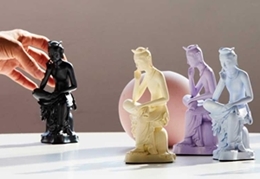
▲ 국립박물관재단에 따르면 '반가사유상 미니어처'가 지난해 가장 많이 팔린 박물관 관련 상품 1위에 올랐다. The National Museum Foundation of Korea says Pensive Bodhisattva miniatures were the bestselling item last year at the National Folk Museum of Korea. (National Museum Foundation of Korea - 국립박물관문화재단)
# 국립중앙박물관 즐기기 (上) - Enjoying National Museum of Korea (I)
- '사유의 방'에서 반가사유상을 만난 감동을 간직하고 싶다면 '반가사유상 미니어처'를 집으로 데려가자. BTS의 RM이 작업실에 놓아둔 사진을 자신의 SNS에 올려 화제가 되기도 했다. 박물관 곳곳에 위치한 기념품 가게에서 다양한 색상과 크기로 만날 수 있다. 이 밖에도 박물관 전시품을 활용한 다양한 상품이 마련돼있다.
- To remember the awe felt when seeing the Pensive Bodhisattva statues in the Room of Quiet Contemplation, consider buying miniatures of the statues at the museum. RM, a member of the K-pop group BTS, posted a photo of such a miniature at his studio on social media that went viral. The figurines can easily be found at souvenir stores throughout the museum and come in a range of colors and sizes. Other items based on museum displays are also available.
- 외국인을 위한 정기 해설이 매일 진행된다. 박물관 소속 전문 해설사와 자원봉사자가 약 1시간에 걸쳐 대표 소장품을 영어, 일본어, 중국어로 해설해 준다. 외국인 관람객 누구나 정해진 시간에 무료로 참여할 수 있다. 월별, 언어별로 일정이 조금씩 다르니 박물관 홈페이지(https://www.museum.go.kr/site/eng/content/tours_and_services)에서 미리 확인하자.
Regular tours for foreign visitors are available daily. Professional guides and volunteers at the museum explain in an hour the museum's leading collections in English, Japanese, and Chinese for free tours offered at select times. The times vary by month or language, so please check the schedule on the museum's website (www.museum.go.kr/site/eng/content/tours_and_services).
서울 = 이경미 기자 km137426@korea.kr
사진 = 이준영 기자 coc7991@korea.kr
By Lee Kyoung Mi, km137426@korea.kr
Photos = Lee Jun Young



.jpg)





0 comments: